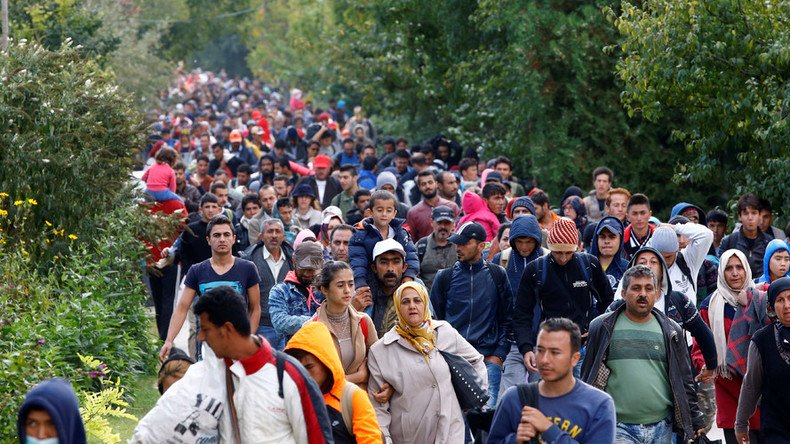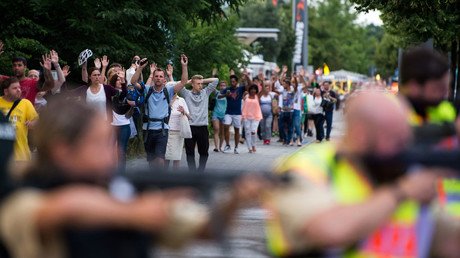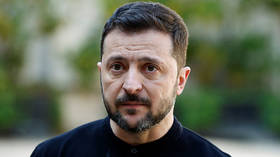Hundreds of leads on possible terrorists among refugees – German police

Germany’s Federal Criminal Police says hundreds of refugees in the country might be linked to terrorism. Officials, however, do not want a “general suspicion” tag to be applied, despite recent attacks by migrants.
The number of migrants under suspicion of links to terrorism as well as the amount of investigations against potential terrorists in their ranks is on the rise, the German Federal Criminal Police (BKA) told the Neue Osnabruecker Zeitung newspaper.
According to the outlet, the criminal police have 410 leads on possible terrorists among asylum seekers in Germany, with investigations launched in 60 cases.
"Given the ongoing immigration to Germany, we must assume that there could be active and former members, supporters and sympathizers of terrorist organizations or Islamist-motivated war criminals among the refugees,” the BKA warned. The number of leads on possible terrorist acts went up from 369 last year, the body says, adding that “Europe and Germany have been on the radar” of Islamic terrorist organizations for some time.
The statement comes as Germany is still reeling from a spate of four violent attacks - three of which were committed by migrants. On July 24, a Syrian refugee armed with a machete killed a woman and injured two other people in southwest Germany. Later that day another asylum seeker from Syria injured 12 people in a suicide blast in the city of Ansbach. Just a week earlier, a 17-year-old Afghan asylum seeker wielding an axe and a knife injured four people on a train in Wurzburg.
Senior German officials have reiterated, though, that there should be no “general suspicion” against asylum seekers. “We must not put all refugees under general suspicion, even if there are ongoing investigations in specific cases,” German Interior Minister Thomas de Maiziere said.
His view was echoed on Monday by the government’s vice-spokesperson, Ulrike Demmer, who insisted that the danger from refugees is neither ”greater” nor ”smaller” compared to the rest of the German population. While most of the latest attacks in the country were committed by refugees, the picture differs in a broader context, Demmer said.
“The majority of terrorists who committed attacks in the past months in Europe were no refugees,” she said during a press conference. A similar statement was made last week by Peter Altmaier, the head of the Federal Chancellery, following the attack in Wurzburg. Altmaier said that most of the terrorists who committed crimes in Europe were “born and raised here.”
“Such massacres are certainly not typical for refugees in our country,” Bavaria’s Interior Minister, Joachim Herrmann, said in response to the latest attacks, as quoted by Deutsche Presse Agentur.
A word of concern however came from Berlin senator Frank Henkel. “No one should be deluded at this point: We obviously have imported some brutal people who are ready to commit barbaric crimes in our country,” Henkel said in a statement.
The leader of the German Die Linke party slammed Merkel’s refugee policy in the wake of the attacks. “The events of the past few days show that the acceptance and integration of a large number of refugees and migrants is tied up with significant problems and is more difficult than Merkel tried to persuade us last autumn with her reckless ‘Wir schaffen es' [we can do it],” Sahra Wagenknecht wrote.
Following Chancellor Merkel’s open-door policy hundreds of thousands of refugees entered Germany in 2015. The mood started shifting against the newcomers though with Germans launching massive protests after migrants allegedly sexually harassed dozens of women in Cologne last New Year’s Eve.
A recently published PEW survey showed nearly 60 percent of Europeans – including those surveyed in Germany – believe the threat of terrorism increases as more refugees arrive in their countries.
EU officials are meanwhile becoming increasingly cautious. "Europe‘s doors are open to those who flee war and persecution and who seek asylum, but we will defend ourselves against attacks on our way of life," European Commission spokesman Margaritis Schinas told journalists on Monday while reacting to the latest attacks in Germany. "Our sense of compassion does not and must not come at the expense of our security," he added.
French Prime Minister Manuel Valls said there will be “more similar attacks,” as quoted by Express. “Even if these words are hard to say, it's my duty to do so: There will be other attacks and there will be other innocent people killed,“ he went on to say.
The media outlet also quoted UKIP defense spokesman Mike Hookem, who blames Chancellor Merkel for “huge security risks” posed by her open-door migrant policy.
A call for action was meanwhile voiced over the weekend by Hungarian President Viktor Orban. He pledged a united “European army” to face challenges for the continent, including “migration.”
The EU should face a “new reality,” Ricardo Baretzky, president of the European Centre for Information Policy and Security, told RT. He said that risks of “infiltration” and “sleeper cells” were reported by his organization over the years.
“Without proper screening of backgrounds you have to expect such things to happen,” Baretzky said with regard to refugees in Europe not being thoroughly checked by authorities. Europe is only “at the birth” of the migration issue, the expert claimed. He added that the continent should team up in its efforts to ensure more security. “Reform of the policies” and a “single judicial system across Europe” would be part of any solution, Baretzky said.














